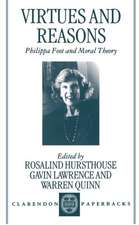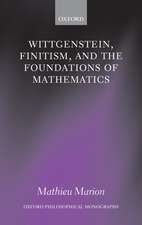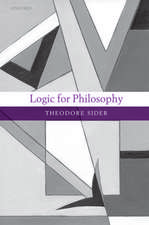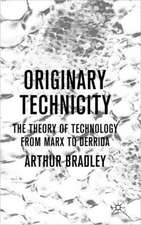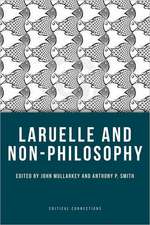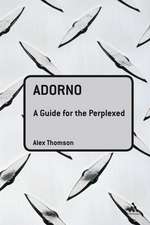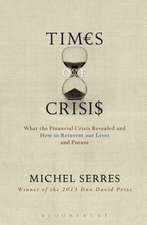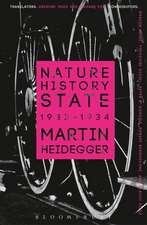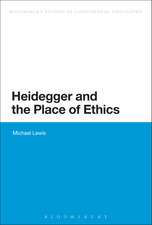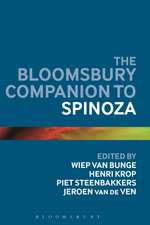Principles of Non-Philosophy
Autor Professor Francois Laruelle Traducere de Anthony Paul Smith, Nicola Rubczaken Limba Engleză Hardback – 8 mai 2013
| Toate formatele și edițiile | Preț | Express |
|---|---|---|
| Paperback (1) | 113.41 lei 6-8 săpt. | |
| Bloomsbury Publishing – 22 mar 2017 | 113.41 lei 6-8 săpt. | |
| Hardback (1) | 250.02 lei 6-8 săpt. | |
| Bloomsbury Publishing – 8 mai 2013 | 250.02 lei 6-8 săpt. |
Preț: 250.02 lei
Preț vechi: 386.84 lei
-35% Nou
Puncte Express: 375
Preț estimativ în valută:
47.84€ • 50.18$ • 39.83£
47.84€ • 50.18$ • 39.83£
Carte tipărită la comandă
Livrare economică 01-15 aprilie
Preluare comenzi: 021 569.72.76
Specificații
ISBN-13: 9781441177568
ISBN-10: 1441177566
Pagini: 344
Dimensiuni: 129 x 198 x 25 mm
Greutate: 0.45 kg
Editura: Bloomsbury Publishing
Colecția Bloomsbury Academic
Locul publicării:London, United Kingdom
ISBN-10: 1441177566
Pagini: 344
Dimensiuni: 129 x 198 x 25 mm
Greutate: 0.45 kg
Editura: Bloomsbury Publishing
Colecția Bloomsbury Academic
Locul publicării:London, United Kingdom
Caracteristici
Offers
an
original
and
important
understanding
of
the
relationship
between
science
and
philosophy.
Notă biografică
François
Laruelle
is
Emeritus
Professor
at
the
University
of
Paris
Ouest,
Nanterre
La
Défense
(Paris
X)
and
lectures
at
the
Collège
International
de
Philosophie.
He
is
the
creator
of
the
concept
of
'non-philosophy',
author
of
over
twenty
books,
and
director
of
L'Organisation
Non-Philosophique
Internationale.Nicola
Rubczak
is
a
PhD
candidate
at
the
Centrefor
Research
in
Modern
European
Philosophy,
Kingston
University.Anthony
Paul
Smith
is
Assistant
Professor
in
Religion
at
La
Salle
University
and
Fellow
at
the
Institute
for
Nature
and
Culture,
DePaul
University.
Cuprins
Cloning
the
Untranslatable:
Translators'
Introduction
\
Preface
\
Introduction
\
1.
Problematic
of
Non-Philosophy
\
2.
First
Science
as
Unified
Theory
of
Science
and
Philosophy:
Or,
Democracy
within
Thought
\
3.
Unfied
or
"Non-Cartesian"
Theory
of
the
Subject:
Duality
of
the
Ego
and
the
Subject
\
4.
Determination-in-the-Last-Instance:
Transcendental
Theorem
of
the
Force-(Of)-Thought
\
5.
The
Method
of
Dualysis:
(Performation,
Cloning,
a
priori)
\
6.
The
Constitution
of
the
Non-Philosophical
Order
\
Index
Recenzii
At
last
Laruelle's
first
full
articulation
of
non-philosophy
is
available
in
English,
a
book
every
bit
as
consequential
as
Deleuze's
Difference
and
Repetition
or
Badiou's
Being
and
Event.
Here
Laruelle
takes
two
of
the
most
appealing
traditions
in
western
thought,
immanence
and
materialism,
and
drives
them
all
the
way
to
the
end
of
the
night.
In
so
doing
he
ceases
participation
in
philosophy
entirely,
forming
no
relation
with
it.
Instead
Laruelle
runs
along
side
philosophy,
in
parallel
to
it,
subjecting
philosophy's
basic
mannerisms
to
a
more
rigorous
axiomatization.
By
withdrawing
from
the
decision
to
reflect,
Laruelle
discovers
the
immanent
destiny
of
nature,
perhaps
for
the
first
time.
I am delighted to see the appearance of this English translation ofPrinciples of Non-Philosophy, one of Laruelle's major works. The project is formidable: nothing less than "non-philosophy"-as in "non-Euclidean"- which is not the simple lack or absence of philosophy, nor what philosophy has marginalized, nor anti-philosophy, nor meta-philosophy, nor the end or death of philosophy. What's left? A withdrawal or suspension of the authority of philosophy in order to undertake a new practice of philosophy more "rigorous" than philosophy, to think not "about" but "from out of" and "according to" the non-objectifiable experience of what Laruelle calls radical immanence, the One, or the Real. It sounds at times not unlike Heidegger's idea that there is something to be thought in metaphysics to which metaphysics has no access. Our thanks to translators Nicola Rubczak and Anthony Paul Smith for their considerable labor in making the important work of this daring if daunting thinker accessible to Anglophone readers.
I am delighted to see the appearance of this English translation ofPrinciples of Non-Philosophy, one of Laruelle's major works. The project is formidable: nothing less than "non-philosophy"-as in "non-Euclidean"- which is not the simple lack or absence of philosophy, nor what philosophy has marginalized, nor anti-philosophy, nor meta-philosophy, nor the end or death of philosophy. What's left? A withdrawal or suspension of the authority of philosophy in order to undertake a new practice of philosophy more "rigorous" than philosophy, to think not "about" but "from out of" and "according to" the non-objectifiable experience of what Laruelle calls radical immanence, the One, or the Real. It sounds at times not unlike Heidegger's idea that there is something to be thought in metaphysics to which metaphysics has no access. Our thanks to translators Nicola Rubczak and Anthony Paul Smith for their considerable labor in making the important work of this daring if daunting thinker accessible to Anglophone readers.

